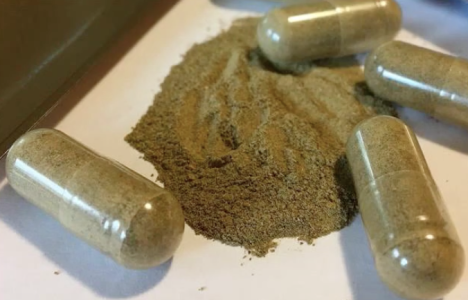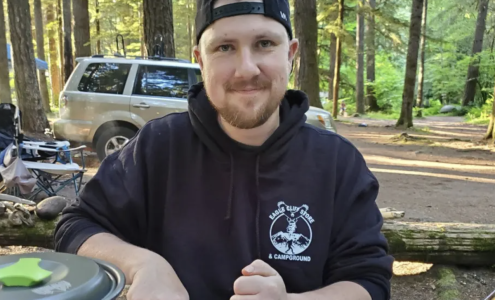The hidden dangers of a "natural" supplement: Families call for change after tragic losses
By
Veronica E.
- Replies 0
Disclaimer: The information provided in this article is for educational purposes only and is not intended as a substitute for professional medical advice, diagnosis, or treatment. Always consult your physician or other qualified healthcare providers with any questions you may have regarding a medical condition or before making any changes to your health regimen.
Many people trust products labeled "all-natural" or "plant-based," believing they must be safe.
Unfortunately, for two mothers who lost their sons, that assumption proved devastating.
Their stories shine a light on a supplement made from a Southeast Asian tree that is easy to buy at gas stations, smoke shops, and online—with little warning about the risks.
Though often marketed as a remedy for pain, anxiety, and even opioid withdrawal, kratom can have potent, addictive, and sometimes deadly effects.
Now, grieving families and medical experts are urging the public to approach such products with caution and calling for stronger regulations.

A son lost after believing a product was safe
Jordan McKibban of Alabama avoided even over-the-counter pain relievers for arthritis, preferring natural remedies.
In April 2022, he mixed a tablespoon of kratom powder into his lemonade after being told it was harmless and impossible to overdose on.
Hours later, his mother, Pam Mauldin, found him unresponsive.
The autopsy identified mitragynine, kratom’s active compound, as the cause of death.
Mauldin says she not only lost her son, but also the life milestones she had hoped to share with him.
Also read: What’s Hidden in Our Past? How Leaded Gasoline Contributed to 150 Million Mental Health Cases!
What kratom is—and why it can be dangerous
Kratom leaves have long been used in Southeast Asia for their stimulating and sedative effects, depending on the dose.
In the US, it’s sold in powder, capsule, gummy, and drink form, often without dosage guidelines or safety warnings.
The FDA has not approved kratom for any medical use and warns it is “not lawfully marketed” as a drug, supplement, or food additive.
Side effects can range from dizziness and high blood pressure to sedation, psychosis, and, in rare cases, death—particularly when combined with other substances or consumed in more potent forms.
Also read: What you need to know about "gas station heroin"—the illegal drug hiding in plain sight
The rise of a more potent compound
A modified form, 7-hydroxymitragynine (7-OH), is even more addictive and powerful—sometimes stronger than morphine.
Addiction specialist Dr. Robert Levy warns that it can quickly cause dependence and withdrawal.
“If you take enough of it, kratom acts like an opioid,” he says, adding that overdoses can ruin lives just as other substance use disorders do.
FDA officials have called for urgent regulation to avoid a new wave of opioid-like addiction.

Also read: Are you taking these two common medications? Here’s why they could be deadly when combined!
Another family’s heartbreak
Jennifer Young of Ohio lost her son, Johnny Loring, at age 27.
He began using kratom for anxiety and continued despite seizures.
He died during a family outing; toxicology showed high levels of mitragynine and gabapentin.
Young later found 20 packs of kratom in his room and says she hadn’t realized how addictive it was.

Also read: 6 popular supplements that could be silently wreaking havoc on your health—a doctor explains!
Why “natural” doesn’t mean safe
Experts caution that natural origins do not guarantee harmlessness—arsenic, for example, is also plant-derived.
Dr. Levy notes that some users may not be able to control their intake, leading to escalating use and possible addiction.
Families like Mauldin’s and Young’s are now pushing for clearer warnings, quality control, and public education.
Also read: Is your go-to supplement putting your life at risk? Nationwide recall issued over deadly risk
Steps to protect yourself and loved ones
If you need help
For those struggling with substance use, treatment and recovery are possible.
Contact your doctor, a local support group, or SAMHSA’s helpline at 1-800-662-HELP for confidential assistance.
The stories of Jordan and Johnny are painful reminders that “natural” is not the same as “safe.”
Greater awareness, open conversations, and stronger regulations could help prevent more lives from being cut short.
Read next: Thinking about taking supplements? Here’s what you should know first

Have you or someone you know had an experience with kratom or another supplement marketed as “all-natural”? Let us know in the comments below.
Many people trust products labeled "all-natural" or "plant-based," believing they must be safe.
Unfortunately, for two mothers who lost their sons, that assumption proved devastating.
Their stories shine a light on a supplement made from a Southeast Asian tree that is easy to buy at gas stations, smoke shops, and online—with little warning about the risks.
Though often marketed as a remedy for pain, anxiety, and even opioid withdrawal, kratom can have potent, addictive, and sometimes deadly effects.
Now, grieving families and medical experts are urging the public to approach such products with caution and calling for stronger regulations.

Families are speaking out about the dangers of kratom after losing loved ones to the unregulated supplement. Image Source: YouTube / Boundless Content Space.
A son lost after believing a product was safe
Jordan McKibban of Alabama avoided even over-the-counter pain relievers for arthritis, preferring natural remedies.
In April 2022, he mixed a tablespoon of kratom powder into his lemonade after being told it was harmless and impossible to overdose on.
Hours later, his mother, Pam Mauldin, found him unresponsive.
The autopsy identified mitragynine, kratom’s active compound, as the cause of death.
Mauldin says she not only lost her son, but also the life milestones she had hoped to share with him.
Also read: What’s Hidden in Our Past? How Leaded Gasoline Contributed to 150 Million Mental Health Cases!
What kratom is—and why it can be dangerous
Kratom leaves have long been used in Southeast Asia for their stimulating and sedative effects, depending on the dose.
In the US, it’s sold in powder, capsule, gummy, and drink form, often without dosage guidelines or safety warnings.
The FDA has not approved kratom for any medical use and warns it is “not lawfully marketed” as a drug, supplement, or food additive.
Side effects can range from dizziness and high blood pressure to sedation, psychosis, and, in rare cases, death—particularly when combined with other substances or consumed in more potent forms.
Also read: What you need to know about "gas station heroin"—the illegal drug hiding in plain sight
The rise of a more potent compound
A modified form, 7-hydroxymitragynine (7-OH), is even more addictive and powerful—sometimes stronger than morphine.
Addiction specialist Dr. Robert Levy warns that it can quickly cause dependence and withdrawal.
“If you take enough of it, kratom acts like an opioid,” he says, adding that overdoses can ruin lives just as other substance use disorders do.
FDA officials have called for urgent regulation to avoid a new wave of opioid-like addiction.

Jordan McKibban, 37, died after using kratom, an “all-natural” supplement sold both online and in stores. Image Source: Pam Mauldin / New York Post.
Also read: Are you taking these two common medications? Here’s why they could be deadly when combined!
Another family’s heartbreak
Jennifer Young of Ohio lost her son, Johnny Loring, at age 27.
He began using kratom for anxiety and continued despite seizures.
He died during a family outing; toxicology showed high levels of mitragynine and gabapentin.
Young later found 20 packs of kratom in his room and says she hadn’t realized how addictive it was.

Johnny Loring, 27, died after using kratom, which he believed was a safe, natural remedy. Image Source: Jennifer Young / New York Post.
Also read: 6 popular supplements that could be silently wreaking havoc on your health—a doctor explains!
Why “natural” doesn’t mean safe
Experts caution that natural origins do not guarantee harmlessness—arsenic, for example, is also plant-derived.
Dr. Levy notes that some users may not be able to control their intake, leading to escalating use and possible addiction.
Families like Mauldin’s and Young’s are now pushing for clearer warnings, quality control, and public education.
Also read: Is your go-to supplement putting your life at risk? Nationwide recall issued over deadly risk
Steps to protect yourself and loved ones
- Be skeptical of “all-natural” claims.
- Talk to your children and grandchildren about supplement risks.
- Check with a healthcare provider before trying kratom for any condition.
- Report any side effects to the FDA’s MedWatch program.
- Support regulatory and educational efforts for supplement safety.
If you need help
For those struggling with substance use, treatment and recovery are possible.
Contact your doctor, a local support group, or SAMHSA’s helpline at 1-800-662-HELP for confidential assistance.
The stories of Jordan and Johnny are painful reminders that “natural” is not the same as “safe.”
Greater awareness, open conversations, and stronger regulations could help prevent more lives from being cut short.
Read next: Thinking about taking supplements? Here’s what you should know first
Key Takeaways
- Two grieving mothers are warning about kratom’s dangers after their sons died from using it, believing it was safe.
- Kratom can be addictive, cause severe side effects, and even lead to death, particularly in more potent forms or when mixed with other substances.
- Experts say modified versions like 7-hydroxymitragynine can be as strong as opioids, yet packaging often lacks warnings, dosage instructions, or quality control.
- Families and medical professionals are calling for stronger regulation, public education, and support for those struggling with substance use disorders.
Have you or someone you know had an experience with kratom or another supplement marketed as “all-natural”? Let us know in the comments below.






